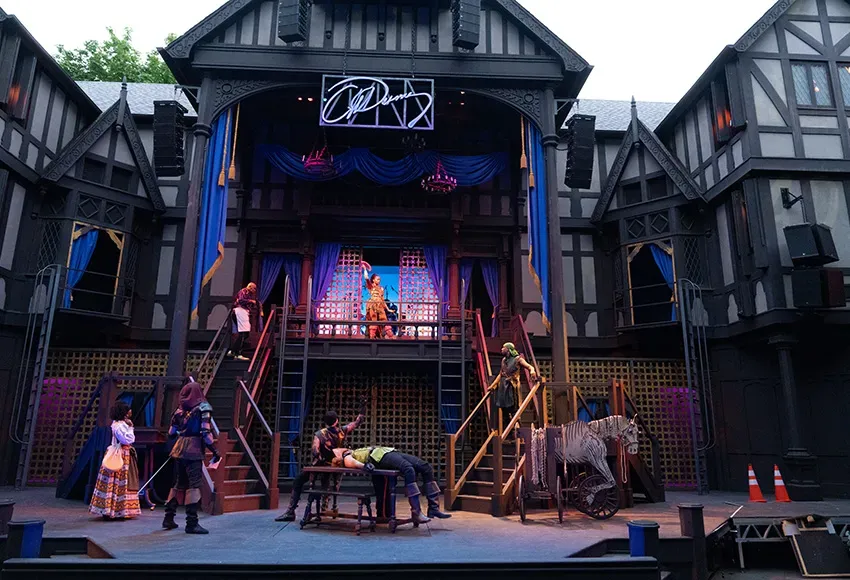Last night I dreamed about my dear friend and writing buddy Marian Michener, who died of Huntington's disease in 2019. A lifelong fan of the Oregon Shakespeare Festival, Marian introduced me to it in 1998. (A few years and many plays later, she said, "I knew that if I could get you to Ashland once, you'd be a lifer.") Until the disease incapacitated her, Marian reviewed OSF for the SGN, as well as writing the popular "Dyke About Town" column under the pseudonym Mercy Moosemuzzle.
Marian didn't live to see the combination of COVID-19 and summer wildfires that has brought OSF to the brink of financial ruin. She didn't live to see racist death threats and lack of support from longtime donors and subscribers cause Nataki Garrett, the first Black artistic director of OSF, to resign a month ago. I wish Marian were still alive, but these developments would have broken her heart.
Crisis upon crisis
"I have spent four years in crisis," Garrett told American Theatre in an interview about her resignation. "You kind of have to get out before you burn out."
Who can blame her? After she received death threats last year, Garrett couldn't leave her home without a security detail. She couldn't accompany her young daughter to school, because she didn't want to endanger other children and their parents and teachers.
Less extreme than the death threats but also destructive were letters she received from a group of people who called themselves "the old white guard." "They were upset because in 2021 I didn't program Shakespeare," Garrett said. It should be noted that in 2021, the festival was under severe public health restrictions, and a one-woman play about civil rights activist Fannie Lou Hamer was the only show that could be presented.
It should also be noted that in 2022 and 2023, Garrett programmed the same ratio of Shakespeare plays to new work as her predecessor, Bill Rauch. (Rauch is a Gay white man who mounted forward-thinking productions, hired directors and actors of color, introduced gender-bending casting, and directed a Gay version of Oklahoma, apparently without repercussions.)
These facts lead me to infer that racism and misogyny, rather than programming choices, led to most of the criticism Garrett received during her four-year tenure.
Perhaps separate from pushback by the "old white guard," OSF has experienced unprecedented budgetary shortfalls. Shortly before the opening of this year's summer season, the festival launched an emergency fund drive called "The Show Must Go On." Actors who had been rehearsing for months were told that the whole season might be canceled. Fortunately, enough supporters stepped up to make it possible to offer four plays, plus a fifth one to open in August. (Pre-COVID, OSF ran nine plays at a time during the summer.) The season was shortened by a month, and a holiday show planned for November and December was canceled.
Like many arts organizations, OSF has had to lay off most staff members since 2020. In addition, the festival has gone through three executive directors and replaced the development director and the chief operating officer. After the opening performance of The Three Musketeers in the Allen Elizabethan Theatre, the new interim executive director, Tyler Hokama, briefly took the stage and opened his remarks by joking, "Fourteen days, and I'm still here." Then Associate Artistic Director Evren Odcikin spoke at some length about the daunting challenges facing OSF, gave full credit to Garrett for this season, and expressed his gratitude that the festival has survived to continue to deliver great theater. His devotion to the company was particularly impressive, given that a play he was to have directed, Federico García Lorca's Yerma, had been canceled.
In spite of all these setbacks, OSF is offering an enjoyable, varied season. In my opinion, it is still very much worth the trip from Seattle.
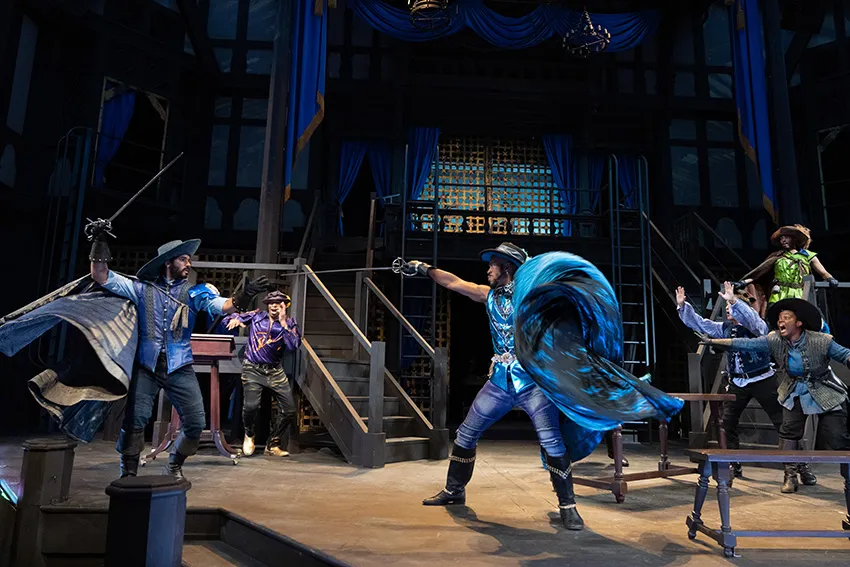
The Three Musketeers
Allen Elizabethan Theatre
I'm not usually a fan of swashbuckling, but this delightful new play was my favorite of the four I attended. Hip-hop and rap, dancing and singing, well-choreographed swordfights, a focus on the relationship between author and characters, broad physical comedy, gorgeous costumes, and clever sets – what's not to like?
Director Kent Gash commissioned playwright, composer, and lyricist Kirsten Childs to create this adaption of the Alexandre Dumas novel. Gash had learned that Dumas' father, the son of a French marquis and an enslaved Haitian woman, was the first mixed-race general in the French army. Childs' play follows the story of the Dumas novel but inserts moving scenes between Dumas and his father, and fascinating dialogue between Dumas and his characters (who want to change the plot).
The play begins with a rap by Jamyl Dobson as a self-satisfied Dumas ("Bow down! Bow down!") and moves into some fancy hip-hop dancing choreographed by Byron Easley. Dobson also plays an imposing Cardinal Richelieu in later scenes; he is excellent in both roles.
In the opening performance, the standout actor was a novice: Malik Bilbrew, who just graduated from college and is playing his first professional role as D'Artagnan. His singing voice and acrobatic skill are both exceptional, and he seemed to be loving every minute onstage.
Omolade Wey and Eunice Woods were marvelous as the heroic Constance and the villainous Milady, respectively. Anthony Michael Martinez as the Duke of Buckingham and Andrew Montgomery Coleman as King Louis couldn't have been more amusing. I credit costume designer Kara Harmon with much of the comedic success of the production: her costumes are not only beautiful but laugh-out-loud funny. Buckingham's tight pink suit and the king's bedroom slippers – you just have to see them.
U. Jonathan Toppo has been the OSF fight director for as many years as I've been going to Ashland, and he knows his stuff. The swordfights are fabulous.
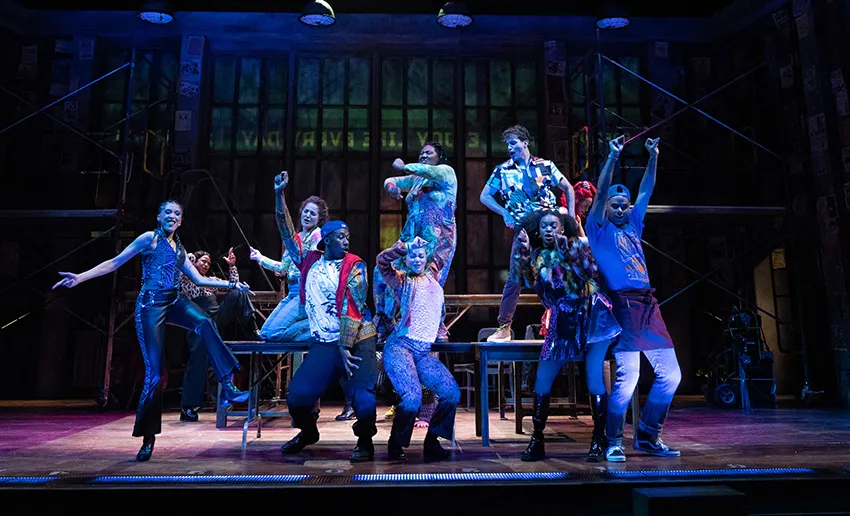
Rent
Angus Bowmer Theatre
Rauch introduced musical theater into the OSF repertoire in 2009, and there's been a musical on the schedule nearly every year since then. Jonathan Larson's Rent was a good choice for an audience emerging from a pandemic, because his musical (loosely based on the opera La Bohème, which was set during the 19th-century tuberculosis epidemic) takes place in the 1980s, the early days of the AIDS epidemic.
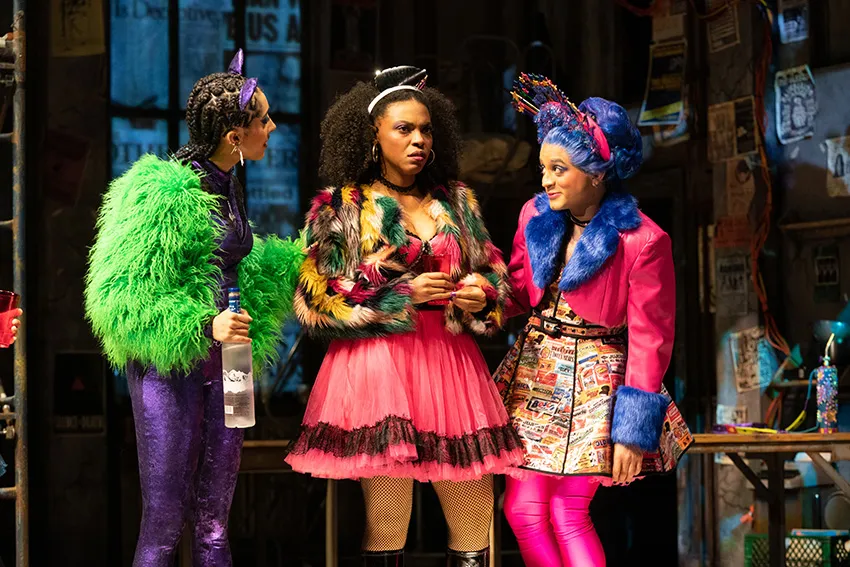
Rent is an ensemble play about a group of friends and lovers dealing with desire, illness, poverty, and heartbreak. In the words of director Tiffany Nichole Greene, "They run on stolen joy and borrowed time." Greene has assembled a first-rate ensemble; if there's a standout performance, it's that of Z Infante as the generous, completely lovable drag queen Angel.
The OSF production features the lively choreography of Jon Rua, a skilled group of musicians led by Dolores Duran-Cefalu, and a versatile, effective set designed by Arnel Sancianco. Even if you know this show by heart, I think you'll enjoy it again in this wonderful production.
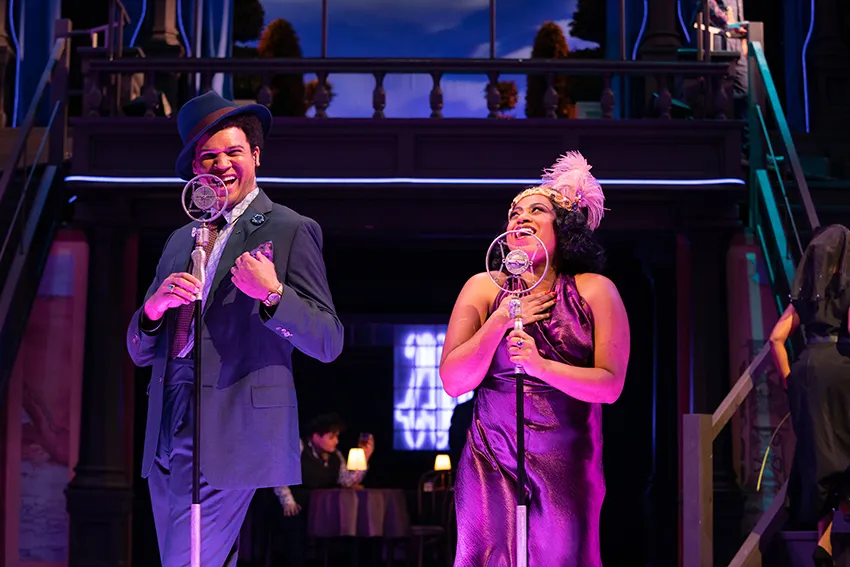
Twelfth Night
Allen Elizabethan Theatre
Twelfth Night was Marian's favorite Shakespeare play, and it's easy to see why. Its heroine, Viola, is a feisty young woman who disguises herself as a man, attracting the amorous attention of both Duke Orsino (who is confused because he'd always thought he was heterosexual) and Orsino's lady-love Olivia (who doesn't realize she's falling in love with a woman). The whole comedy is an entertaining yet profound riff on gender and identity.
Director Dawn Monique Williams has set the OSF production in the Jazz Age of the 1920s and '30s, and the concept works beautifully. Period costumes designed by Melissa Torchia are splendid, and composer and sound designer Everett Elton Bradman provides the perfect blues and jazz melodies for Shakespeare's lyrics. Before Armando McClain as Orsino even pronounces the first line of the play – "If music be the food of love, play on" – Arielle Crosby as Feste the Fool (a role almost always played by a man) brings down the house with her glorious singing and stage presence.
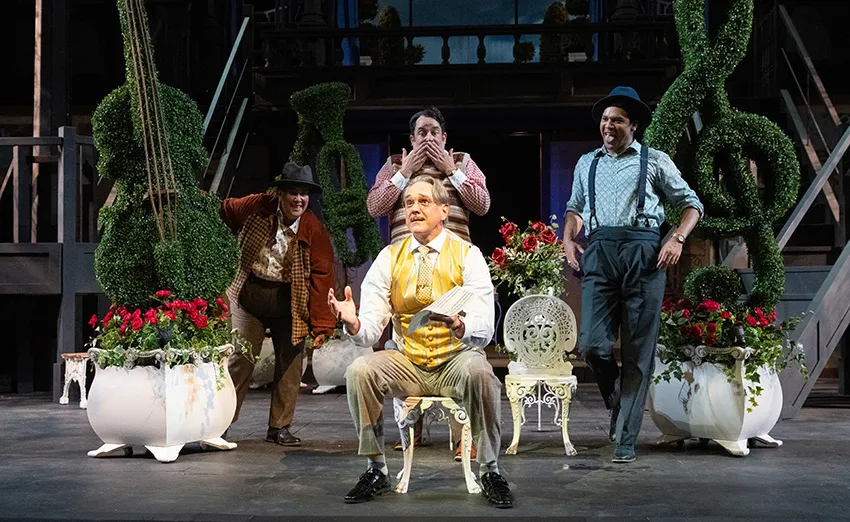
In another inspired bit of cross-gender casting, Catherine Castellanos plays Sir Toby Belch with gusto reminiscent of Bobby Moynihan's "Drunk Uncle" character on Saturday Night Live.
Al Espinosa, whom I've never seen before in a comic role, is superb as the puritanical Malvolio, who gets his hilarious comeuppance from the other characters.
The only weak link is Sam Jackson in a low-energy performance as Viola. This role is the most important one in the play, so it's a testament to the strength of the rest of the production that even a lackluster Viola doesn't ruin the show.
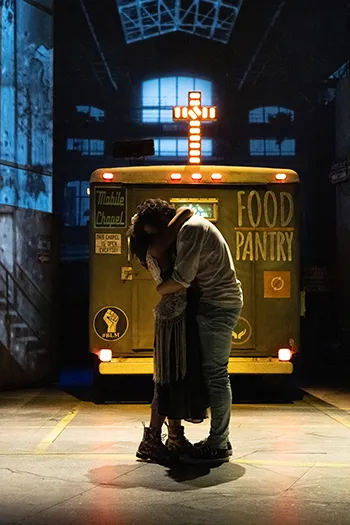
Romeo and Juliet
Angus Bowmer Theatre
There is much to like about this production of one of Shakespeare's most beloved and familiar tragedies. Director Nataki Garrett has set the play in a homeless encampment beneath the Bay Bridge in Oakland. The set designed by Nina Ball, lighting by Xavier Pierce, and projections by Rasean Davonté Johnson are spectacular, with video projections creating the realistic illusion of headlights crossing the bridge, the moon rising, then daylight returning.
The Capulets live in a dilapidated trailer. A van backed onto the stage serves as a food pantry; when a chapel is needed, a cross rises from the roof of the van and a drape with a stained-glass pattern is drawn across the window.
Because of the current-day setting, fight director Toppo has substituted fistfights, food-throwing, and gunfire for the traditional sword fights, which works well.
In the performance I attended, three actors were magnificent: Caroline Shaffer as Nurse, Donna Simone Johnson as Mercutio, and Tyrone Wilson as Friar Lawrence. Unfortunately, some of the other actors seemed miscast or uncomfortable in their roles. Castellanos, who was so good in Twelfth Night, here muttered incoherently as Capulet. Shauna Miles stumbled around as a drug-addicted Lady Capulet.
Romeo and Juliet are teenagers, but the actors playing them must make us believe that they have enough maturity for true love and marriage. Jeremy Gallardo as Romeo did a better job of this than did Jada Alston Owens, who giggled her way through the play.
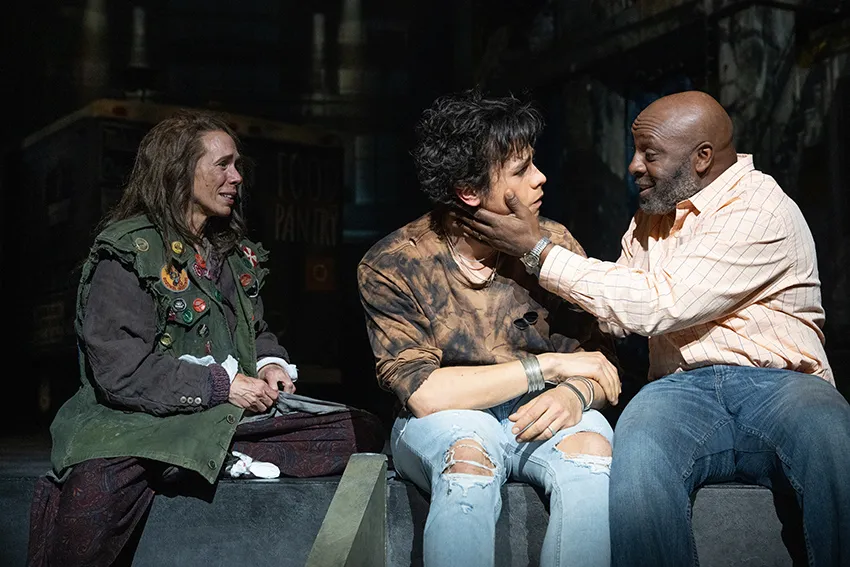
OSF costumes are nearly always a highlight of its productions. The most memorable costume in Romeo and Juliet is that of Nurse, here presented as an addled (but sometimes astute) bag lady wearing a plastic grocery bag for a hat and carrying a ragged doll, which wears a matching hat.
Even with such brilliant touches, the basic concept of the production doesn't quite work. The Capulets and the Montagues are described in the text as wealthy power brokers, but in this production, both families are impoverished, and Capulet is trying to marry off Juliet to the wealthy Paris, who is involved in a property development scheme to evict both the Capulets and the Montagues. Audience confusion ensues.
Coming up next: Where We Belong, To Feel a Thing, and virtual offerings
Madeline Sayet's one-woman play Where We Belong, recently offered by Seattle Rep, will open on August 26 in the Thomas Theatre. Sayet, a member of the Mohegan Tribe, is a well-known Shakespeare scholar and director, and her play concerns Shakespeare's impact on Indigenous communities.
The world premiere of To Feel a Thing: A Ritual for Emergence will play in the Allen Elizabethan Theatre September 23-24. Written by poet adrienne maree brown and composer Troy Anthony, this work features a large choir and "invites listeners to find their own liberation."
The Quills Fest, which combines virtual reality with live performance art, will return for a third year on November 17-18.
Finally, some performances of plays from this season will be available online.
For more information and to purchase tickets, visit https://www.osfashland.org


